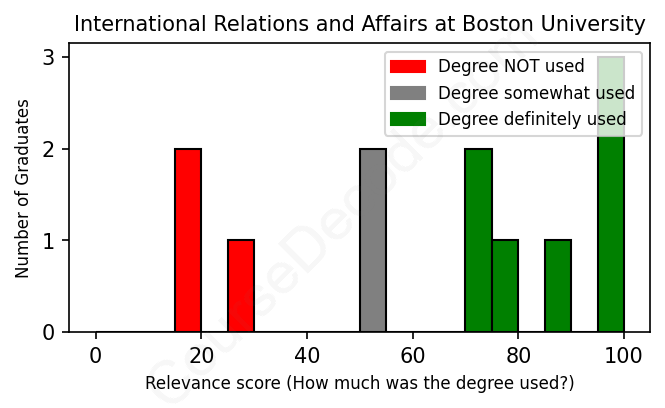
First, some facts. Of the International Relations and Affairs graduates from Boston University we've analyzed , here's how many have used (or NOT used) their degree in their career:

These are estimates based on AI analysis of 12 LinkedIn profiles (see below).
The verdict? Slightly below average. Overall, with an average relevance score of 63%, International Relations and Affairs graduates from Boston University have a slightly lower likelihood (-4%) of finding work in this field compared to the average graduate across all fields:
And for comparison, here's the chart for all profiles we've looked at across all degrees.
Also, after graduating, 41% of these graduates have pursued further education other than another Bachelor's degree (such as a Masters degree or other), compared to the average across all profiles of 35%. This suggests you may need more than just a Bachelors degree to be competitive as a International Relations and Affairs graduate.
See the details:
|
Relevance score: 71% We think this person has gone into a career highly relevant to their degree. We think this person has gone into a career highly relevant to their degree.
DEGREE INFOGraduated in 2015 from Boston University with a Bachelor of Arts (B.A.) in International Relations and Affairs. Also pursued further education since (see below). JOB HISTORY SINCE GRADUATIONFinancial Analyst Commander, Navy Installations Command (CNIC) HQ Nov 2017 - May 2019 Contract Specialist  Naval Supply Systems Command (NAVSUP) 2018 - Sep 2019 Contracts and Agreements Specialist  USAID Sep 2019 - Jun 2021 Contract Specialist  F-35 Joint Program Office Jun 2021 - Jun 2022 International Agreements Specialist  Department of the Navy Research, Development, and Acquisition (RD&A) Jun 2022 - Present FURTHER DEGREES DONE SINCE GRADUATINGMaster of Arts (M.A.)University of Chicago - Committee on International Relations 2015 - 2016 ABOUTSkilled civil service professional with experience in foreign affairs, government/military contracting, and financial management. Educational background in International Relations with a M.A. degree from the University of Chicago and a B.A. degree (summa cum laude) from Boston University. |
The top 10 most common jobs done by the graduates we've analyzed (ranked most common to least) are:
When looking at the job paths of Boston University graduates in International Relations and Affairs, there’s a noticeable trend. Many of these alumni have moved into roles that are quite relevant to their degree, especially in areas like program management, policy analysis, and international development. For example, positions like Program Assistant at organizations focused on peace or conflict resolution directly align with the core principles of International Relations. Others have taken on roles at institutions like the United States Institute of Peace, where their work also heavily capitalizes on their academic background in this field. It's clear that many graduates have found good fits in international organizations and NGOs that focus on global issues, which is fantastic for someone who studied in this area.
However, it’s also important to note that not everyone has stayed closely tied to International Relations in their careers. Some graduates have taken jobs that, while interesting, don’t really utilize their degree in a meaningful way. Roles in teaching, administrative positions, or in the technical fields like software development show a significant disconnect from their studies. It's a mixed bag overall; while a good number have found very relevant positions, others have ventured into jobs that don’t directly engage with the core concepts of International Relations and Affairs. It goes to show that a degree can lead to a variety of paths, and some may find their way back to their academic roots over time, while others may not.
Here is a visual representation of the most common words in job titles for International Relations and Affairs graduates (this is across all International Relations and Affairs graduates we've analyzed, not just those who went to Boston University):

The career trajectories for graduates of International Relations and Affairs from Boston University show quite a mix, but there’s a trend that stands out. For many of these alumni, the first job after graduation often seems to relate directly to their field of study, with several starting off as program assistants, interns, or coordinators in NGOs, governmental organizations, or education-focused roles. This makes sense considering the nature of International Relations, which often leads to positions involving diplomacy, cultural exchange, and program management. However, some graduates have taken more unexpected pathways, entering industries like tech, finance, or education shortly after their degrees.
As for where these graduates end up 5 to 10 years later, it looks like many do find themselves climbing the ladder within fields connected to International Relations, like working in various capacities for organizations focused on peace, security, and human rights, or moving into roles that help shape policies and programs in government bodies. On the other hand, there are also notable numbers who pivoted away completely from their original paths—for example, diving into roles in consulting or even completely different sectors like editing and data analysis. Overall, while quite a few graduates seem to find meaningful and relevant careers in their field, there are also those who appear to have shifted away into other industries that may not directly utilize their International Relations backgrounds. It’s a mixed bag, really!
A Bachelor’s degree in International Relations and Affairs, especially at a school like Boston University, can be pretty challenging but definitely doable if you’re passionate about the subject. You’ll dive into complex topics like global politics, economics, and cultural studies, which can be pretty intensive. The coursework often involves a lot of reading, writing papers, and staying updated on current events, so it requires good time management and critical thinking skills. It’s not the easiest major out there, but if you’re curious about the world and willing to put in the effort, it can be a rewarding experience that keeps you engaged!
Most commonly, in the LinkedIn profiles we've looked at, it takes people 4 years to finish a Bachelor degree in International Relations and Affairs.
Looking at the job paths of these Boston University International Relations graduates, it seems like some have done pretty well in terms of career progression, while others might still be finding their footing. For instance, the 2010 grad who’s now a Senior Manager at DAI likely pulls in a solid salary, especially considering the steady rise in their career. On the flip side, the 2020 grads working as a Director of Operations in politics and another in creative roles might have more variability in pay, depending on the positions and job markets in those sectors. Overall, it looks like those who navigated into managerial roles or stable government positions likely find themselves earning decent money, while others in early career stages are still building experience and salary.
Here is a visual representation of the most common words seen in the "about" section of LinkedIn profiles who have a Bachelor degree in International Relations and Affairs (this is across all International Relations and Affairs graduates we've analyzed, not just those who went to Boston University). This may or may not be useful:

Here are all colleges offering a Bachelor degree in International Relations and Affairs (ordered by the average relevance score of their International Relations and Affairs graduates, best to worst) where we have analyzed at least 10 of their graduates:
| College | Score | Count |
|---|---|---|
 The George Washington University The George Washington University
|
70 | 36 |
 American University American University
|
64 | 21 |
 Boston University Boston University
|
63 | 12 |
 The University of Georgia The University of Georgia
|
56 | 21 |
 University of Southern California University of Southern California
|
56 | 13 |
 James Madison University James Madison University
|
53 | 11 |
 University of California, Davis University of California, Davis
|
50 | 11 |
 University of Colorado Boulder University of Colorado Boulder
|
49 | 16 |
 Florida International University Florida International University
|
47 | 36 |
 Florida State University Florida State University
|
45 | 29 |